Why Homebuyers Are Moving Back to Metro Atlanta’s Cities
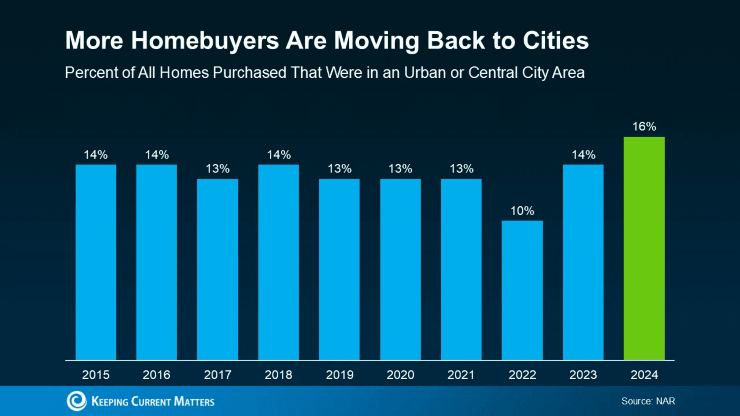
The trend of homebuyers returning to urban and central city areas is gaining momentum across the United States, and Metro Atlanta is no exception. As evidenced by national data trends like the bar chart provided by Keeping Current Matters, sourced from the National Association of Realtors (NAR), the percentage of all homes purchased in urban or central city areas has risen significantly, reaching 16% in 2024—the highest in a decade. This resurgence is mirrored in Metro Atlanta, where cities like Atlanta, Decatur, and Sandy Springs are seeing a renewed interest from homebuyers. As an Atlanta Realtor, I'm excited to explore the key reasons behind this movement and what it means for the future of real estate in Metro Atlanta’s urban cores.
1. The Post-Pandemic Reevaluation of Remote Work in Metro Atlanta
The COVID-19 pandemic initially prompted many Metro Atlanta residents to flee to suburban areas like Alpharetta, Roswell, Marietta, or Peachtree City, seeking more space, affordability, and a quieter lifestyle as remote work became widespread. Between 2020 and 2021, national data showed a dip in urban home purchases to 10%, reflecting this exodus. However, as companies in Atlanta’s thriving business districts (home to major corporations like Coca-Cola, Delta Air Lines, and The Home Depot) adopted hybrid work models, the appeal of city living has resurged. Homebuyers in Metro Atlanta are now balancing the need for space with the convenience of being near downtown Atlanta’s offices, accessible via MARTA or short drives on I-75 and I-85.
There are many opportunities to invest in urban condos, townhouses, or lofts in neighborhoods like Midtown, Buckhead, or the BeltLine, where proximity to work hubs and vibrant communities is a major draw. The flexibility of hybrid work has made it possible for Metro Atlanta homebuyers to enjoy city amenities while maintaining the option to work remotely from a home office or nearby suburban getaway.
2. Rising Costs and Limited Availability in Metro Atlanta’s Suburbs
While Metro Atlanta’s suburbs initially attracted homebuyers during the pandemic, the rapid influx of new residents has driven up housing costs and strained infrastructure in areas like Cobb County, Gwinnett County and Fulton County. As demand surged, home prices soared, making suburban living less affordable for many. The availability of desirable homes—especially those with ample space and modern amenities—has dwindled, creating a competitive market. In contrast, Metro Atlanta’s cities, though also costly in some areas, offer a variety of housing options, including condos, townhouses, and smaller single-family homes that cater to diverse budgets and lifestyles.
The NAR data, showing a rebound in urban home purchases to 16% nationally in 2024, aligns with local trends in Atlanta, where redevelopment projects and infill developments are increasing the supply of city homes. Urban properties in neighborhoods like Poncey-Highland, West End, or Downtown Atlanta represent valuable investment opportunities, offering proximity to job centers, established infrastructure, and shorter commutes compared to rapidly appreciating suburban areas.
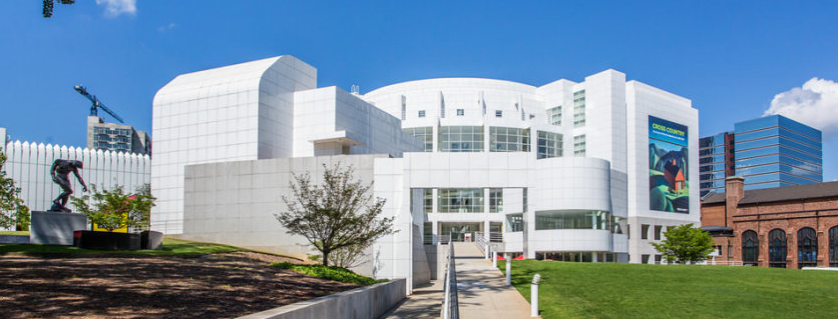
3. The Appeal of Metro Atlanta’s Urban Amenities and Culture
Metro Atlanta’s cities are hubs of culture, entertainment, and social interaction, drawing homebuyers back with their unique offerings. The national upward trend in urban home purchases—climbing from 10% in 2021 to 16% in 2024—mirrors the growing appeal of Atlanta’s vibrant neighborhoods. From the restaurants and nightlife of Midtown to the cultural events at the Fox Theatre, the High Museum of Art, and Piedmont Park, urban Atlanta provides a dynamic lifestyle that suburbs often cannot match.
For families, Metro Atlanta’s city schools, such as those in Decatur or parts of Atlanta Public Schools, offer high-quality education options, while diverse communities and child-friendly public spaces like the BeltLine’s trails attract families to urban living. For young professionals and empty nesters, Atlanta’s urban core offers networking opportunities, cultural events, and a sense of community. This cultural pull is a key reason why I'm seeing increased interest in urban properties, as clients prioritize the convenience and energy of city life over the larger lots of suburban areas.
4. Sustainability and Environmental Concerns in Metro Atlanta
As climate change concerns grow, many Metro Atlanta homebuyers are prioritizing sustainability, making urban living more attractive. Cities like Atlanta offer well-developed public transportation options, including MARTA’s rail and bus systems, as well as bike-sharing programs along the BeltLine, reducing reliance on personal vehicles and lowering carbon footprints. Atlanta’s ongoing investments in green infrastructure—such as urban parks, energy-efficient buildings, and tree canopy initiatives—further enhance its appeal for eco-conscious buyers.
The national trend of rising urban home purchases, peaking at 16% in 2024, aligns with Metro Atlanta’s push toward sustainability. For my clients, urban properties in walkable, transit-friendly neighborhoods represent not only a lifestyle choice but also an environmentally responsible investment. Contrast this with longer commutes and higher energy consumption often associated with sprawling suburban developments.
5. Economic Opportunities and Job Growth in Metro Atlanta
Metro Atlanta remains an economic powerhouse, hosting major corporations, startups, and industries that drive job creation. Even with the rise of remote work, many high-paying and career-advancing opportunities in Atlanta’s business districts still require physical presence. The national rebound in urban home purchases to 16% by 2024 reflects this economic pull, which is particularly strong in Metro Atlanta, where job growth in sectors like technology, healthcare, and logistics continues to thrive.
For entrepreneurs and freelancers, Atlanta’s urban areas offer access to incubators, networking events, and a diverse talent pool, making neighborhoods like Tech Square or the Westside Provisions District ideal for building businesses. My clients benefit from this economic momentum, as urban properties provide proximity to career opportunities and financial stability, appealing especially to Millennials and Gen Z entering the housing market in Metro Atlanta.
6. Urban Revitalization and Investment in Metro Atlanta
Over the past decade, Metro Atlanta has undergone significant revitalization, transforming areas like the Old Fourth Ward, Castleberry Hill, and the Westside into thriving neighborhoods. Investments in infrastructure, affordable housing, and public spaces—such as the expansion of the BeltLine and redevelopment of former industrial sites—have made urban living more appealing. The national NAR data, with urban home purchases peaking at 16% in 2024, reflects the success of these initiatives in Atlanta, as homebuyers are drawn to newly developed or renovated areas with modern amenities and improved quality of life.
Developers and local governments in Metro Atlanta have responded with mixed-use developments that combine residential, commercial, and recreational spaces, creating walkable, self-contained communities. These revitalized urban neighborhoods offer exciting opportunities to invest in properties with strong growth potential and a high quality of life.
7. Changing Demographics and Lifestyle Preferences in Metro Atlanta
Demographic shifts are reshaping Metro Atlanta’s housing market, driving the return to cities. Millennials, now in their prime homebuying years, often prefer urban living due to its convenience, diversity, and alignment with their values. As this generation ages and starts families, they are increasingly seeking out Atlanta neighborhoods with good schools and family-friendly amenities, such as those along the BeltLine or in Decatur. Similarly, empty nesters and retirees are downsizing from suburban homes and moving back to Metro Atlanta’s cities for the cultural offerings, walkability, and social opportunities.
The national trend of rising urban home purchases, climbing to 16% in 2024, highlights how these changing demographics and lifestyle preferences are influencing Metro Atlanta’s real estate market. My home-buying clients are prioritizing convenience, community, and access, signaling a cultural shift toward urban living in Atlanta’s core neighborhoods.
Implications for Metro Atlanta’s Future
The resurgence of urban homebuyers in Metro Atlanta, mirroring the national trend of reaching 16% of all home purchases in urban areas by 2024, suggests a lasting shift in housing preferences. Local policymakers and developers must continue investing in infrastructure, affordable housing, and sustainability to accommodate this growth while addressing challenges like rising costs, traffic congestion, and housing shortages. For homebuyers relocating, this trend presents exciting opportunities to help to find their dream homes in Metro Atlanta’s thriving urban neighborhoods.
For homebuyers, the return to Metro Atlanta’s cities offers investment potential, community engagement, and a vibrant lifestyle. However, it requires careful consideration of factors like cost of living, space constraints, and commute times. As remote and hybrid work continue to evolve, the balance between urban and suburban living in Metro Atlanta may shift further, but the current trend indicates a strong and sustained preference for city life in Atlanta’s dynamic urban core.
As your friendly realtor at PaulMcParland.com, I’m excited to help you explore the opportunities in Metro Atlanta’s thriving urban neighborhoods. Whether you’re looking for an investment, a place to build community, or a vibrant lifestyle, city living in Atlanta offers it all. But we’ll also think about things like cost, space, and commutes to make sure it’s perfect for you. As remote and hybrid work keep evolving, I’m confident our cities will stay a top choice for homebuyers like you.
So, what do you think? Ready to explore Metro Atlanta’s urban real estate? Give me a call or check out PaulMcParland.com, I’d love to help you find your dream home in Atlanta’s dynamic city core. Let’s make your move back to the city an exciting adventure together!
Categories
Recent Posts
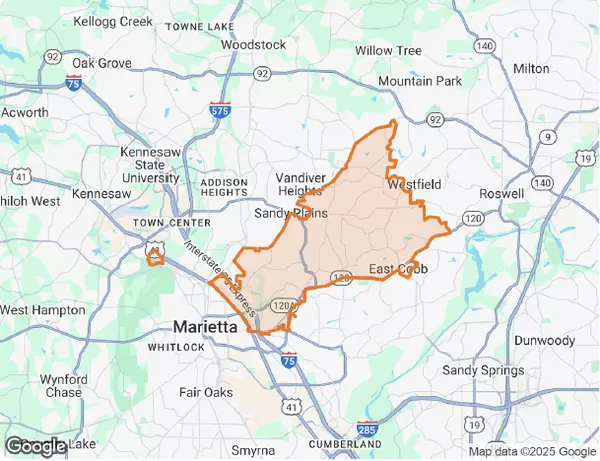

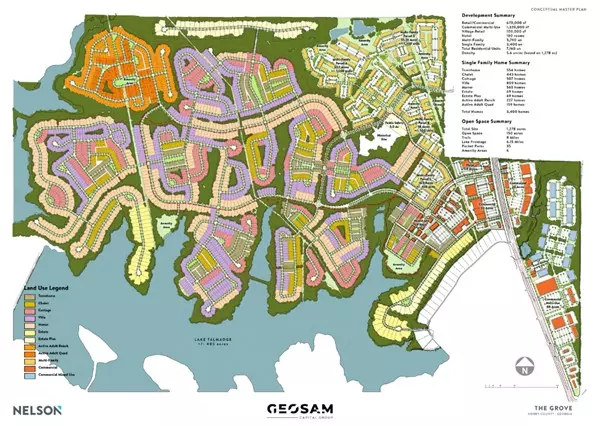
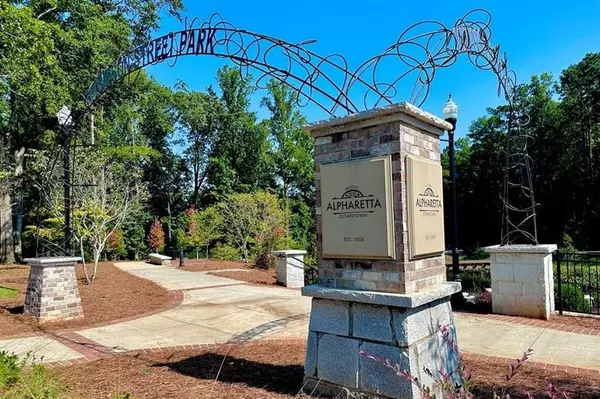
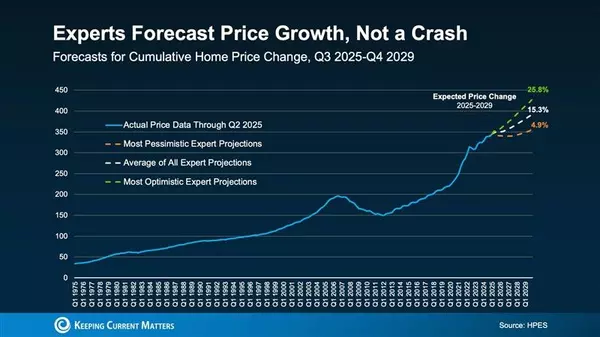
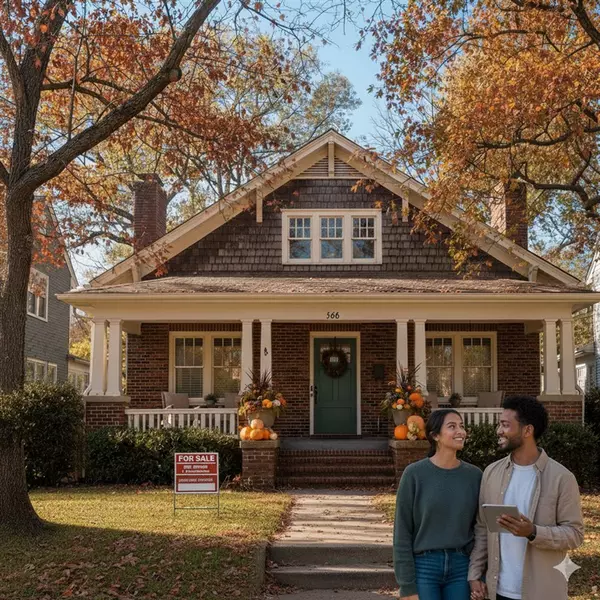

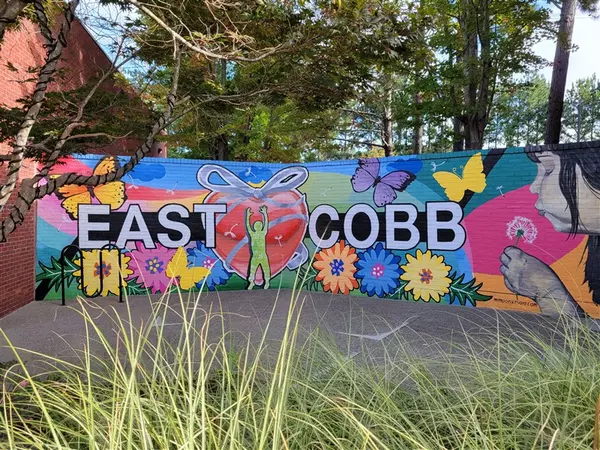
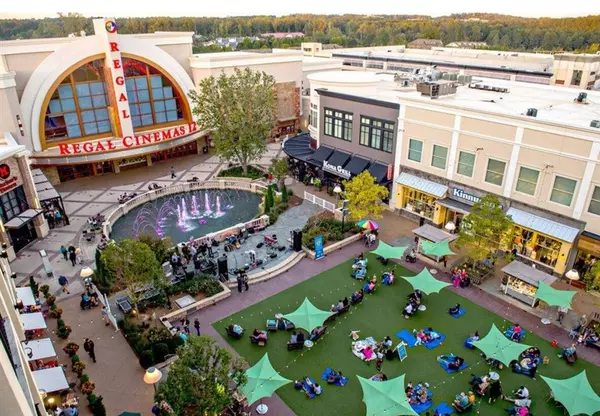


"Whether buying or selling a home, my #1 job is to advise my clients so they optimize their largest financial investment while avoiding any pitfalls that could cost them tens of thousands of dollars. "
